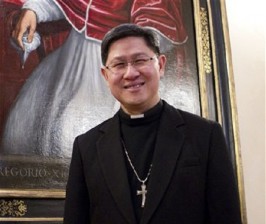Manila Archbishop Luis Antonio Cardinal Tagle and several bishops on Tuesday urged members of the House of Representatives “not to unduly rush” the debates on the reproductive health (RH) bill.
In a statement, Tagle and the bishops of the ecclesiastical province of Manila also called on the lawmakers to uphold “transparency” in the debates and the voting on the proposed law.
“We are appealing to the honorable representatives to give ample time to the deliberations and discernment and not to unduly rush them,” the prelates said.
“We also appeal to them to conduct the deliberations and decision with transparency through nominal voting and respect for the diversity of views,” they added.
Aside from Tagle, the bishops who signed the statement included Gabriel Reyes of Antipolo, Honesto Ongtioco of Cubao, Deogracia Iniguez of Caloocan, Antonio Tobias of Novaliches, Jesse Mercado of Parañaque, Mylo Hubert Vergara of Pasig, Leo Drona of San Pablo, Pedro Arigo of Puerto Princesa, Edgardo Juanich of Taytay and Leopoldo Tumulak of the military.
Bishops’ meeting
The other signatories were Manila Auxiliary Bishops Bernardino Cortez and Broderick Pabillo, Antipolo Auxiliary Bishop Francisco de Leon and the diocesan administrator of Imus Fr. George Morales.
Reyes, chairman of the Catholic Bishops Conference of the Philippines-Episcopal Commission on Family and Life, said that while Malolos Bishop Jose Oliveros had yet to sign the statement, he also supported it.
He said Tagle and the bishops came out with the statement after their pre-Christmas meeting yesterday.
“The bishops are saying ‘please don’t hurry this bill because it’s a very important bill. Let there be more discussions because it will have a very big impact on the country in the long run,’” Reyes said.
He said the vote was going to be close in both the Senate and House of Representatives, with the pro-RH camp having an eight-vote lead in the House.
“It’s small and there are many congressmen against the RH bill who were not present. It can go either way,” he said.
Testing the ties
Reyes said he had hoped President Aquino would change his mind about supporting the RH bill after he attended the thanksgiving Mass for the canonization of St. Pedro Calungsod and the elevation of Tagle to the College of Cardinals.
“I was really praying and hoping that he’d change his mind regarding the RH bill but he didn’t. What can we do?” Reyes said.
He said the Church’s relationship with the Aquino administration would “suffer” if the RH bill were passed.
“Of course, the Church will be very sad about it but it doesn’t mean there will be war. I’m sure it will suffer but it will not be broken,” Reyes said.
Despite a nudge from the President, a final vote on the RH bill is facing delay in the House after opponents of the measure said they would make line-by-line changes and ask for a lengthy nominal vote on each proposal, when the period of amendments resumed on Monday night.
The bill’s main sponsor, Albay Rep. Edcel Lagman, said House leaders should end the amendment period if the “dilatory antics” continued, so the lawmakers could move on to the vote.
At the present pace, a vote on second reading is unlikely this week, said Majority Floor Leader Neptali Gonzales II, who wished that President Aquino would certify the bill as urgent to expedite its progress on the floor.
Leading the amendments charge are Cebu Rep. Pablo Garcia and Cagayan de Oro Rep. Rufus Rodriguez.
President’s request
Until the amendment period is over, the bill cannot be put to a vote on second reading this week, which is what Mr. Aquino asked for when he met lawmakers over lunch on Monday.
When the session ended Monday night, the House was still discussing amendments on page 2 of the 27-page bill.
The House voted 91-75 Monday to reject a Garcia amendment to limit the state’s guarantee of the basic right to reproductive health to married people, instead of providing this to “all people.”
Earlier that day, the House voted 98-90 to reject Palawan Rep. Dennis Socrates’ motion to deliver a speech condemning the acceptance of the substitute bill as the new version of the reproductive health measure. Socrates made his appeal when the privilege hour was over.
On a side issue, Reyes said the Catholic Church should not be blamed for the steep rise in HIV infections in the Philippines.
Reyes noted that HIV infections in the country were rising among men having sex with men, who were not exactly known for following the Church’s teachings against same-sex relations.
Ineffective condoms
He also said condoms were not effective in preventing the spread of HIV because they had “holes” big enough for the virus to pass through. The World Health Organization (WHO), United Nations Population Fund and the Joint UN Program on HIV/AIDS have disputed this.
“With all due respect (to the gay community), HIV is increasing among homosexuals or men who have sex with men. I’m sure if they are having sex with men, they don’t follow the rules of the Church,” Reyes said in a Church forum in Intramuros, Manila.
“I’m sure they are using condoms. If you follow the Church, you will not be using condoms. This threat among them is the highest,” he said.
“They will not mind the teaching of the Church, the main teaching against same-sex intercourse,” he added.
No solution to AIDs
Reyes made the statements after former Health Secretary Alfredo Romualdez said HIV infections increased in the Philippines after the Arroyo administration stopped distributing free condoms due to pressure from the Church.
But Reyes said distributing condoms would not solve the problem of AIDS/HIV in the country.
“It was proven in Africa (that distributing condoms) does not by itself solve the problem of AIDS. In the long run, it’s really abstinence, being faithful and self control,” Reyes said.
The WHO, UNFPA, and UNAIDS have disputed the Church claim that condoms have holes big enough for the HIV virus to pass through.
